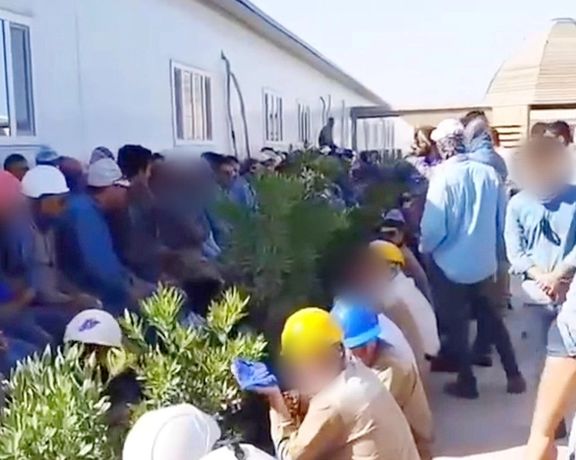Strikes In Iran Gaining Momentum With Over 80 Plants Joining

Strikes by Iranian energy, petrochemicals and steel workers are gaining momentum as new firms have joined nationwide industrial action.

Strikes by Iranian energy, petrochemicals and steel workers are gaining momentum as new firms have joined nationwide industrial action.
Workers in more than 80 companies have joined industrial action, protesting poor working conditions, low wages and rising costs of living, according to the Council for Organizing Oil Contract-Workers' Protests.
The council accused the regime of seeking to sow division among workers through ethnic differences. ”It can be seen in some places that our protest rallies have been dispersed on the pretext that workers belong to a certain ethnicity,” the group said in a statement this week.
“This is while all of us workers from every part of the country have common pains and enemies. All of us are protesting the poverty and rising prices and worsening of our working and living conditions every day.”
Almost all of the striking workers in oil, gas, steel, petrochemicals and other industries, are not officially hired by the country’s oil company or relevant ministries and are working on temporary contracts, so risk their only means of livelihood by joining the strikes.
Labor activists believe warn that society is on the verge of explosion as strikes reach new levels. Experts say there is no end in sight as tensions rise amidst a crumbling economy and the biggest anti-regime sentiment in years.
Strikes at Salman Farsi Petrochemical company
In a bid to retain calm, employers claim that the strikes will end soon, claiming there will be no other rounds of strikes until the end of the summer.
However, the council refuted this. “We firmly declare that we are not slaves to anyone so no one can speak on our behalf,” it said.
In an audio file sent to Iran International and verified by our contacts earlier in the week, a man recounted the ordeal of contract workers, describing their situation as “stuck in hidden slavery”. The worker says the problems stem from the special status of a few well-connected senior managers and systematic corruption in the energy industry.
He explained details of the meagre wages paid with delays and the lack of weekend breaks for overworked and underpaid staff. The worker also went on to explain how the country’s security forces have threatened those striking and their families of serious repercussions if they do not stop participation in industrial action.
The workers who are officially employed by the oil ministry enjoy better conditions and usually do not risk their position by joining the popular movements.
Javad Abbasi Tavallali, a journalist with first hand experience about the working conditions in Asaluyeh -- a city in Bushehr province and home to the majority of the country’s energy plants and refineries – told Iran International earlier in the week that almost all these government contractors, such as Petro Sina Arya, PetroPars, and Petro Paydar Iranian, are affiliated with the Revolutionary Guard.
The Council did not disclose the exact number or percentage of the striking workers or when the factories will have to stop operations if the strikes continue.
The current round of strikes started on Saturday as workers demand wage increases in the face of more than 50 percent annual inflation.